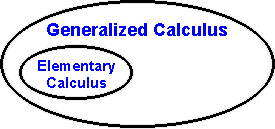Math2.org Math Tables:
|
| (Math) |
The following was derived a couple of years ago therefore notation
and methods are lax. I do not know how instrumental this is in broadening the realm
of calculus or useful since many results relations revert to elementary
calculus. I am still searching for an application for this theory. Write
to me at the above address with comments.

Definition of a calculus: A calculus is a system composed of the four building blocks: the discrete limit, continuous limit, discrete iteration and continuous iteration.
| The Building Blocks of a Calculus | |
| Discrete Limit * | Continuous Limit |
| Discrete Iteration | Continuous Iteration |
For elementary calculus, these building blocks are:
| Elementary Calculus | Continuous | Discrete |
| Limit | ||
| Iteration |
Continuous Limit: This is a limit expressing change in a function over an infinitely small interval. It need not be linear change, as in the derivative, but may be any infinitesimal relationship.
Discrete Iteration: As its name implies, it is a repeated opperation performed a finite number of times in a finite interval. It need not be the sum of all the values of a function when given integer parameters, as in the summation, but may be any iterative opperation such as a product or continued fraction.
Continuous Iteration: This is the Discrete Iteration made continuous. There are set rules to convert a discrete iteration into its continuous counterpart. A continuous iteration can be expressed in terms of an infinite limit of the corresponding discrete iteration. This concept can be seen in the case of the integral, which is the summation of partitions under a function as the size of the chosen partitions approaches zero.
>>> The continuous iteration and the continuous limit are always inverse opperations of each other. In the case of linear (elementary) calculus, the integral and derivative have inversive properties as defined by the Fundamental Theorem of Calculus. <<<
The Discrete Limit: I have not yet worked out a theory on this building block. By intuition, I assume it exists. I define it to be the inverse opperation of the discrete iteration and express the finite change (not neccessarily linear change) of a function in a finite interval. This may be [ f(x+1)-f(x) ] / 1 for linear calculus, but I have not verified that hypothysis.
Note the relations between these buildng blocks: